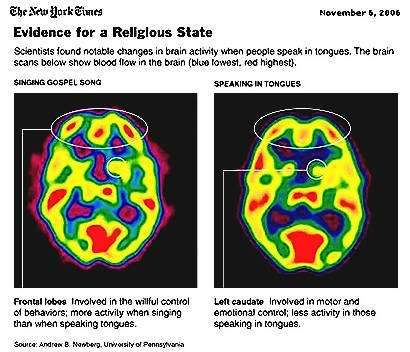
Plato called it the Demiurge and it meant a good entity who made the good world. Different people have different terms for their concepts of a Supreme Being --- there's God or the Holy Trinity, Allah, Yahweh, Elohim, the One, the Great Spirit, Shang-Ti, Ngai (Maasai), Brahman, and many, many more. Between believers(whatever their religion is) and non-believers, the former usually outnumber the latter. In the gap between the two, there are the skeptics and the doubters, who, easily swayed with arguments and fleeting explanations about God or his non-existence, can either add up or subtract to the numbers of the two colliding thoughts of belief and unbelief.
A few days ago, scientists published the results of a study in which they tried "to capture" an evidence of the presence of God by doing the first functional neuroimaging tests on five healthy, active, religious women who were "speaking in tongues." Speaking in tongues is the term used when the extremely religious among us try to express themselves in unintelligible syllables. The scientific term is Glossolalia. The contemporary religious explanation for speaking in tongues is, "a glorious presence," and the faithful generally say this happens when one is possessed or inspired by the Holy Spirit.
In the neuroimaging study done, the regional cerebral blood flow in the brain during glossolalia was described. As can be seen in the images above (courtesy of the NYT), there's little activity in the frontal lobes and language centers of the brain during glossolalia.
The study somehow leads credence to the claim that those who speak in tongues are not in some state of trance, but are self-conscious and aware of what is happening(frontal lobe observation). The left caudate, which is usually involved with positive emotion and pleasure, has been shown to be inactive during the phenomenon. Scientists do not know why this is so, as the usual assumption is that with a glorious presence, there must be a consequent upliftment of emotions. True, if one is willfully doing it...but if indeed, some sort of holy spirit has taken possession, then the neuroimaging results might explain why this is so. Hah! But that, I think, is jumping into conclusion already. More studies are needed, of course.
Can science look for God? Does God want to be found by science? Who knows? People will always try to look for answers.
3 reactions:
This is very interesting. Another point to make the debate between believers and non-believers more fierce than ever. ;)
i'll just say: i need more faith to believe there is no God than the faith i need to believe there is a God. this is a stolen line, but i totally agree.
Dr. Emer, I used to run a religious retreat ministry - Charismatic. There was a lot of "praying in tongues" ... and we used to call it "the baby gift," because we believed it was the "first step" toward receiving other gifts (healing, prophecy, interpretation of tongues ... etc. ... the entire biblical list.)
I'll share a few interesting things I experienced in the years we were in ministry ...
While visiting Jerusalem, one of of the ladies in our group realized that the "tongues" she had been "speaking" in prayer were the first part of the evening prayer call - in Arabic. Her tongues changed the same day. She went home not knowing what language her new tongues were in.
Another lady kept repeating words which I recognized from their Latin roots, although I'm not certain of which Latin language it comes from - "aqua da vida" ... water of life. She had no idea what she was uttering.
We used to believe that it related to the following biblical passage:
Romans 8:26 "[...] We do not know what we ought to pray for, but the Spirit himself intercedes for us with groans that words cannot express."
It's an interested phenomenon, whatever its source.
Post a Comment